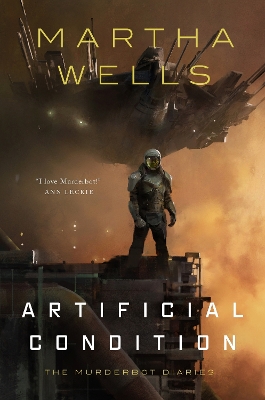Reviewed by Quirky Cat on
I knew right away I was going to like this series, even before I read the first book. So far, it hasn’t disappointed me (and I don’t think it will). I love Murderbot and the very strange and clever ways they handle all sorts of situations; from social interactions (hint: awkwardly) to threatening ones, and everything in between.
Artificial Condition felt a bit more cerebral than All Systems Red did. Which makes sense. All Systems Red had to establish the world, the characters, and the situation Murderbot was in, as well as explaining what made Murderbot unique from the rest of the SecUnits. Artificial Condition didn’t have to do any of that. Instead we got to focus entirely on Muderbot’s personality and personal quests. In this case, Murderbot is determined to find out what happened to it in the past.
You see, Murderbot knows that it went rogue and killed a bunch of humans. While its memory had been wiped, the organic parts will still maintain a fractured idea of the whole, so there’s still some truth left. They also know (obviously) that they’ve successfully hacked themselves. What they don’t know is which order these events occurred in. Did they hack themselves to go rogue (and thus kill all of those humans), or did they hack themselves after, in order to save that from happening again? I love the question this raises; it’s an interesting puzzle, to say the least.
I love the little details that went into this novel. Such as how Murderbot traveled, interacted with other bots and humans, and how they figured things out as they went. It all showed us a lot about how Murderbot handles different problems and in many ways it made the character seem so much more human than they’d like us to consider them.
Murderbot is such an interesting character study. At what point, exactly, can we say a person or being achieves sentience? Martha Wells explores this subject without ever having to be so blunt as to actually say those words out loud. Is Murderbot a sentient being? Is the fact that they hacked themselves, thus freeing themselves, a signifier of an autonomous being? What about their joy of media (trashy television shows, mostly)? They have likes, loves, dislikes, and even a nice array of social and mental anxieties. Is that enough? Or is it more? Is it how they treat humans? Because humans aren’t always kind to each other, I mean look at the events of the last book for crying out loud. In short, I love the million questions this series raises just by existing.
Both novels have been relatively short, and yet I can’t say enough good things about them. I’m already counting down the days for the release of Rogue Protocol, and sincerely hope the date doesn’t get changed or put back (that’d just be my luck!). I know the fourth book has already gotten a title (Exit Strategy, for those that are curious), but I actually hope the series continues beyond that point as well.
For more reviews, check out Quirky Cat's Fat Stacks
Reading updates
- Started reading
- 10 May, 2018: Finished reading
- 10 May, 2018: Reviewed
